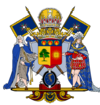1729 Shirerithian general elections
| |||||||
| |||||||
| Turnout Adelsraad: None (postponed) Turnout Folksraad: None (postponed) | |||||||
| |||||||
The Shirerithian elections of 1729 were a series of elections that were planned to take place in the Imperial Republic of Shireroth, following the previous elections held in 1723 AN. However, these elections were ultimately postponed due to a combination of factors, including the illness of Steward Louis Thuylemans and concerns about foreign interference in the country's politics.
Background
Steward Louis Thuylemans, who was instrumental in uniting the factions within the Mango-Strengthening Movement during the previous two elections, broke his arm on New Year's Day of 1729 AN and subsequently fell ill. His condition caused concern among the ruling parties, who began to stall for time, citing the need for Thuylemans' recovery before proceeding with the elections.
Meanwhile, tensions between Shireroth and the Benacian Union continued to escalate, as Operation Jagdbeute - in which the Benacians attempted to gain control of military equipment in case Shireroth were to leave the Raspur Pact - had not been forgotten. This led to growing worries about the threat that the Benacian Union posed to Shireroth's sovereignty and national security.
Postponement of Elections
In light of these circumstances, the Imperial Court decided to postpone the elections, citing the need to protect the country from foreign interference and ensure the stability of the Imperial Republic. The decision was met with mild protest from the Eastern Dominions, but the blessing of the Heavenly Light and the confirmation of the Kaiseress' Mandate of Heaven helped to keep dissent in check.
However, the postponement of the elections was not without controversy. In the Emirate of Sathrati, which had long been a hotbed of anti-imperial sentiment, the decision was seen as undemocratic and further evidence of the Imperial Republic's disregard for the rights and freedoms of its subjects. This resentment only grew louder after the publication of the imperial decree "Shireroth First: A New Era of Independence and Self-Reliance", which banned foreigners from holding important positions in the Imperial Republic.
Consequences
The postponement of the 1729 Shirerothian general elections marked a significant turning point in the political landscape of the Imperial Republic. It contributed to the growing unrest, protests, and eventual rebellion in Sathrati, during the Emergency of 1730.
Moreover, the postponement of the elections highlighted the deepening divisions between Shireroth and the Benacian Union, which could eventually lead to the outbreak of war between the two powers. It also underscored the Imperial Republic's difficult ongoing struggle to balance its desire for independence and self-reliance with the need for cooperation and collaboration with foreign powers and an increasing lack of willpower to peacefully resolve issues among the ruling elite and opposition.
| |||||||||||||||||||||||||||||||||||||

